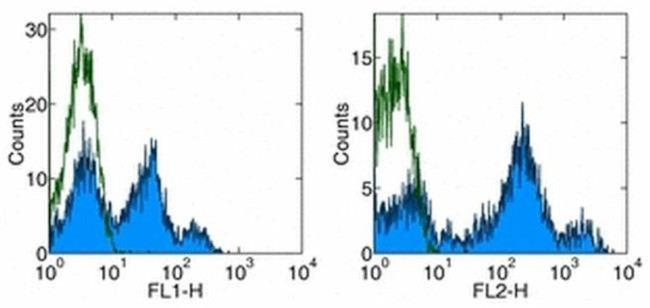Search Thermo Fisher Scientific
Invitrogen
CD26 Monoclonal Antibody (2A6), PE, eBioscience™
FIGURE: 1 / 7
CD26 Antibody (12-0269-42) in Flow


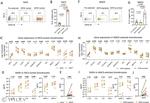
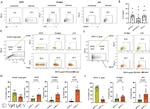
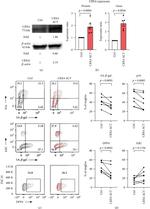

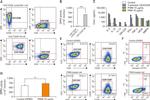
Product Details
12-0269-42
Species Reactivity
Published species
Host/Isotype
Recommended Isotype Control
Class
Type
Clone
Conjugate
Excitation/Emission Max
Form
Concentration
Purification
Storage buffer
Contains
Storage conditions
Shipping conditions
RRID
Product Specific Information
Description: The 2A6 monoclonal antibody reacts with human CD26, a 110 kDa type II transmembrane dimer. CD26 is an ectoenzyme with dipeptidyl peptidase IV activity expressed by T cells and is upregulated upon T cell stimulation. It is thought that CD26 plays a role in interaction with the extracellular matrix molecules and in T cell activation.
Applications Reported: The 2A6 antibody has been reported for use in flow cytometric analysis.
Applications Tested: This 2A6 antibody has been pre-titrated and tested by flow cytometric analysis of normal human peripheral blood cells. This can be used at 5 µL (0.5 µg) per test. A test is defined as the amount (µg) of antibody that will stain a cell sample in a final volume of 100 µL. Cell number should be determined empirically but can range from 10^5 to 10^8 cells/test.
Excitation: 488-561 nm; Emission: 578 nm; Laser: Blue Laser, Green Laser, Yellow-Green Laser.
Filtration: 0.2 µm post-manufacturing filtered.
Target Information
CD26 (dipeptidyl peptidase IV, DPP IV), adenosine deaminase (ADA) binding protein) is a homodimeric atypical serine protease belonging to the prolyl oligopeptidase family. CD26 is expressed on lymphocyte cells and is upregulated during T-cell activation. CD26 is also expressed on activated B cells and natural killer cells and abundantly on epithelia. CD26 is implicated in a variety of biological functions including T-cell activation, cell adhesion with extracellular matrix such as fibronectin or collagens, and in HIV infection. CD26 identical to adenosine deaminase complexing protein-2, and to the T-cell activation antigen CD26. Further, CD26 is an intrinsic membrane glycoprotein and a serine exopeptidase that cleaves X-proline dipeptides from the N-terminus of polypeptides. Alterations in CD26 peptidase activity are characteristic of malignant transformation, and the enzymatic activity increases dramatically with tumor grade and severity. CD26 is expressed in various blood cell types, but also in cells that are histogenetically related to activated fibroblasts. Alterations in CD26 density have been reported on circulating monocytes and CD4+ T cells during rheumatoid arthritis and systemic lupus erythematosus.
For Research Use Only. Not for use in diagnostic procedures. Not for resale without express authorization.
How to use the Panel Builder
Watch the video to learn how to use the Invitrogen Flow Cytometry Panel Builder to build your next flow cytometry panel in 5 easy steps.
Bioinformatics
Protein Aliases: ADABP; ADCP-2; Adenosine deaminase complexing protein 2; CD26; Dipeptidyl peptidase 4; Dipeptidyl peptidase IV; dipeptidyl-peptidase 4; dipeptidylpeptidase 4; dipeptidylpeptidase IV (CD26, adenosine deaminase complexing protein 2); DPP IV; DPP-IV; T-cell activation antigen CD26; TP103
Gene Aliases: ADABP; ADCP2; CD26; DPP4; DPPIV; TP103
UniProt ID: (Human) P27487
Entrez Gene ID: (Human) 1803

Performance Guarantee
If an Invitrogen™ antibody doesn't perform as described on our website or datasheet,we'll replace the product at no cost to you, or provide you with a credit for a future purchase.*
Learn more
We're here to help
Get expert recommendations for common problems or connect directly with an on staff expert for technical assistance related to applications, equipment and general product use.
Contact tech support
